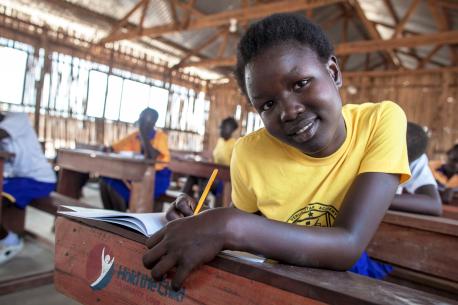
Celebrating International Day of the African Child
International Day of the African Child is a key moment when the world’s attention is turned to the resilience and courage of young people.
The International Day of the African Child is a key moment when the world’s attention is turned to the resilience and courage of young people on the African continent. With Africa’s population of children under 18 currently at an estimated 600 million and projected to expand by 40% by the year 2050, African children are central to the continent’s future. Thus, June 16, is an opportunity to reflect on the progress the African continent has made in ensuring children’s rights, and a chance to assess upcoming challenges in securing those rights.

From June 11 to 13, 2021, teams of community relays from the Ministry of Health in Mauritania went door to door as part of an integrated national campaign to screen for malnutrition and catch up on immunization, targeting 761,800 children aged 0-5 years. © UNICEF/UN0475273/Pouget
The International Day of the African Child was established initially by the Organization of African Unity (OAU) as a way to memorialize the June 16, 1976 Soweto student uprisings in South Africa. On this day, approximately 20,000 black students protested the quality of their education and demanded to be taught in their own language rather than in Afrikaans. Unfortunately, these students were met with brutal violence and hundreds were killed in the uprising. Celebrating the Day of the African Child is about recognition of the sheer bravery, fortitude, and perseverance of the thousands of young people who understand the key role that they play in ensuring that their rights are won.

Friends sit by a UNICEF-supplied mosquito net in Bienythiang in Akoka county, Upper Nile state, South Sudan.
© UNICEF/ UN0359995/Mark Naftalin
The COVID-19 pandemic presents many challenges ahead for the African continent – not the least its impact on millions of young people. Health emergencies take a heavy toll on children that goes beyond the risk of the contraction of the disease itself. In sub-Saharan Africa, approximately 350 million children have been out of school, and in addition to a hold on education, these children are facing food insecurity, health threats due to limited access to hygienic environments, rising poverty, and vulnerability to child marriage, abuse, and violence. Resuming routine vaccinations, interrupted by the pandemic, against diseases like measles and polio and accelerating the delivery of the COVID-19 vaccine to countries in need is UNICEF’s top priority. UNICEF is a key partner of COVAX, the largest vaccination initiative ever, and is using its decades-long expertise in global immunization to deliver and administer 2 billion doses of the COVID-19 vaccine by the end of 2021.
Keeping in spirit with the courageous children of Soweto, UNICEF is committed to promoting equity for every child, everywhere so that every child can reach its full potential. This support means that we work to address inequity at its root, from education to health and poverty. The Diaspora has been consistently willing to step in to embolden UNICEF’s child-centered programs in Africa. A recent successful campaign, “Impact Week of Service” by the Regional Southern Chapters of the Delta Sigma Theta Sorority, Inc. to address emergency education needs for children of African descent is just one example of how members of the African Diaspora have illustrated their commitment to the continent. The work of Diaspora communities plays is a crucial role in bringing awareness to the global sphere. Important connections such as these strengthens UNICEF’s support for the expansion of opportunity for communities around the world. UNICEF USA is dedicated to embracing diversity in the perspectives and voices of its stakeholders and partners from the Diaspora, because we know such collaborations will ultimately enhance the human rights and development of children in Africa and throughout the world.
If you would like to learn more, please contact about becoming a partner of UNICEF USA:
Anne-Marea Griffin
Senior Director, Diaspora Partnerships
UNICEF USA
amgriffin@unicefusa.org
Top Photo: 15 year old Martha participates in UNICEF's 'Dear Teacher' letter writing workshop at Venus Star School in Juba, South Sudan. The workshop allowed students to express what they missed about their teachers during school lockdown as a result of COVID-19. © UNICEF/UN0430072/Mark Naftalin
HOW TO HELP
There are many ways to make a difference
War, famine, poverty, natural disasters — threats to the world's children keep coming. But UNICEF won't stop working to keep children healthy and safe.
UNICEF works in over 190 countries and territories — more places than any other children's organization. UNICEF has the world's largest humanitarian warehouse and, when disaster strikes, can get supplies almost anywhere within 72 hours. Constantly innovating, always advocating for a better world for children, UNICEF works to ensure that every child can grow up healthy, educated, protected and respected.
Would you like to help give all children the opportunity to reach their full potential? There are many ways to get involved.





